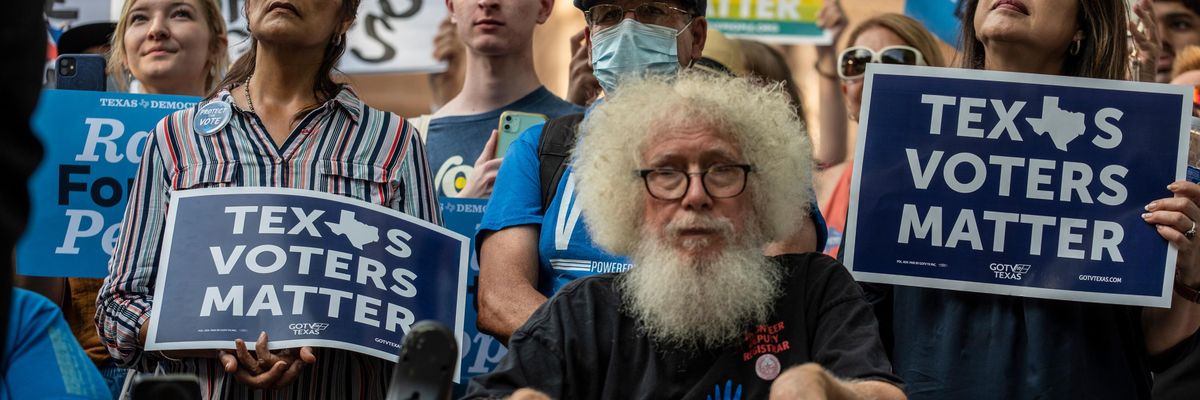Nearly 60 Democratic members of the Texas state House of Representatives plan to leave town on Monday in an effort to thwart--for the second time--their Republican counterparts' attempt to ram through a sweeping voter suppression package.
"I think it's hard for us to look at this and see any other option for us but to break quorum again."
--Texas state Rep. Eddie Rodriguez
NBC Newsreported Monday that as the Texas GOP moves to pass its proposal during the month-long special session, at least 58 state House Democrats are "expected to bolt from Austin" to deny Republicans the two-thirds quorum necessary to conduct legislative business. One unnamed source told NBC that "Democrats expect state Republicans to ask the Department of Public Safety to track them down" and force them to return to the chamber.
Many of the Democratic lawmakers reportedly intend to fly to Washington, D.C. to demand federal action on voting rights as Republicans in Texas and across the nation move aggressively to restrict ballot access. Last month, Republicans in the U.S. Senate used the archaic legislative filibuster to block debate on the For the People Act, legislation that experts say would neutralize GOP-authored voter suppression bills.
"Texas legislators are risking arrest to stop a voter suppression bill," tweeted Charles Booker, a progressive Democrat running to unseat Sen. Rand Paul (R-Ky.) in next year's midterms. "If they can do that, we can end the filibuster in the Senate."
Texas Democrats' plans to bring the state legislature to a halt began to emerge just over a month after they successfully blocked a similar Republican voter suppression measure by walking off the House floor, running out the clock on the legislative session.
On Sunday, following marathon hearings in the House and Senate, Republicans advanced slightly modified versions of the legislation out of key committees and set the stage for final votes, leading Democrats to begin considering their last-ditch options to stop the bill.
"I think it's hard for us to look at this and see any other option for us but to break quorum again," state Rep. Eddie Rodriguez (D-51) said in an appearance on MSNBC over the weekend.
During testimony against the legislation on Saturday, former U.S. congressman and erstwhile presidential candidate Beto O'Rourke said that the Texas GOP's voter suppression push is part of "the single greatest coordinated attack on democracy in our lifetimes, and perhaps in the life of this country."
"It is the 'big lie' that is the source and inspiration for so many of these voter suppression bills," O'Rourke said, referring to former President Donald Trump's false voter fraud narrative.
Texas already has some of the most restrictive voting laws in the country, and analysts warn the GOP's proposal will only make matters worse, disproportionately impacting people of color, people with disabilities, poor people, and other marginalized communities.
In its current form, the Republican proposal would, among other changes, implement new ID requirements for mail-in ballots, ban 24-hour voting and drive-through voting sites, and empower partisan "poll watchers."
"These measures would compound state laws that already make it hard to vote," Ari Berman of Mother Joneswrote last week. "Texas limits mail-in voting to people over 65 and voters who are out of town during the election, in jail, or have a 'sickness or physical condition' that prevents them from going to the polls. (It was one of only five states that did not expand mail-in voting during the pandemic in 2020.)"
"Voting in person requires showing certain types of IDs--a list that seems designed for partisan skew," Berman continued. "Under the state's voter ID law, a handgun permit is an acceptable form of identification but a state-university issued ID is not. The state has closed 750 polling places since the Supreme Court gutted the Voting Rights Act in 2013, more than any other state, disproportionately in Black and brown communities."
It's not clear whether Texas Democrats will be able to sustain their coordinated effort for the duration of the special session, which ends in 27 days.
"Even if Democratic lawmakers stay out of state for the next few weeks," the Texas Tribunenoted, "the governor could continue to call 30-day sessions or add voting restrictions to the agenda when the legislature takes on the redrawing of the state's political maps later this summer."
Speaking to the Houston Chronicle just before boarding a flight to the nation's capital, Texas state Rep. Jasmine Crockett (D-100) said that "we're not coming back."
"We saw the writing on the wall," Crockett added. "[Republicans] were going to just push this down our throats and say, 'This is what you get.'"

